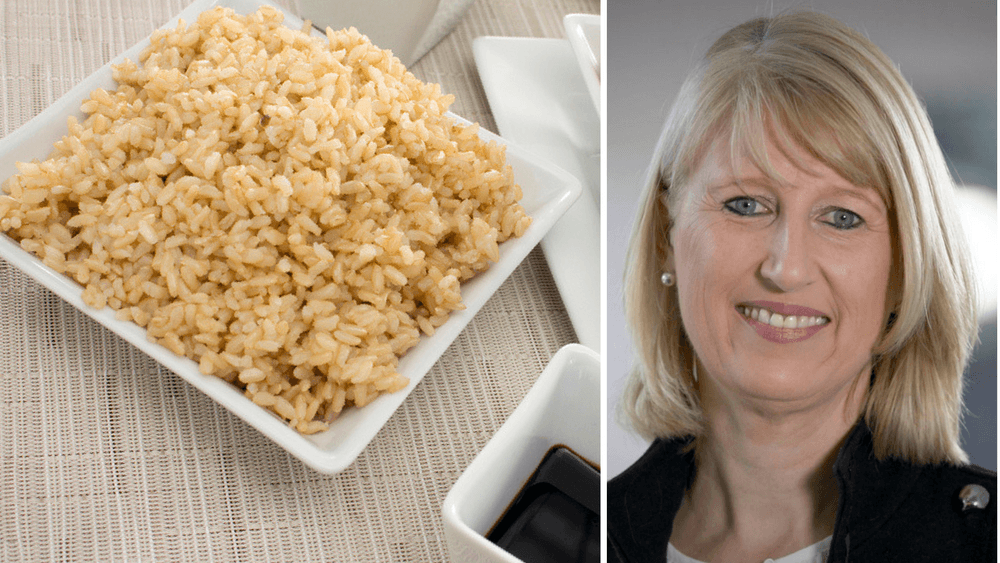World Vision CEO grew up eating rice and soy sauce
“It formed me, and it made connecting with poverty a much easier thing to do,” says Claire Rogers
Australia’s World Vision recently appointed a new CEO, the first woman to be appointed to the role. Eternity’s Tess Holgate sat down with Claire Rogers to find out how it’s been going.
You’ve been in this job for one month. What is the most surprising thing you’ve discovered so far?
The quality and the lasting impact of the work we do.
I’ve been a donor for 10 years, and I knew I was doing some value, but it [has been] very very encouraging to see the power of the work that World Vision does.
I am encouraged by the degree to which we call for leaders to step up and take leadership roles within the community.
Our Christian heritage is very real.
All the programmes we bring to a poverty context are then owned [by the community], because change happens at a community level.

The new CEO admires the rice produced from a mill which World Vision Australia helped the local community establish Khaing Min Htoo
We’re in the business of bringing hope, and hope is important to me. I have lots of hope, and that’s a function of my country and context.
World Vision played a key role in reducing infant mortality.
This is not available to many people in poverty contexts.
Tell me about your own Christian faith.
I grew up in a Christian family and one that was very aware of materialism in society and made some deliberate choices not to do that.
Once a week on a Wednesday night we used to have rice and soy sauce as a simple meal, so we understood what poverty was like. It wasn’t cool, as a kid!
Once a week on a Wednesday night we used to have rice and soy sauce as a simple meal, so we understood what poverty was like.
It wasn’t cool, as a kid!
But it formed me, and it made connecting with poverty a much easier thing to do.
At about 16 I made my own commitment, and since then have had a long career in the secular world as a Christian leader – which was what I felt really strongly that God had called me to.
I also chaired the board of Ridley College (a not-for-profit ministry training college in Melbourne).
So this job now is kind of bringing those two parts of my career together.
What are your hopes for World Vision over the next five to ten years?
Under Tim Costello’s leadership, World Vision played a key role in reducing infant mortality. My hope is that we continue that drive and see the numbers reduce further.
Jesus has called us to love the poor. Full stop.
We’re going to need to engage with supporters in new digital ways. The power of digital to bring the field up close to people who may not be able to travel to these locations to see it for themselves is enormous.
And World Vision has the ability to speak to the secular world and engage the secular world in issues of poverty.
Some Christians will be surprised to discover that World Vision is a Christian organisation. What do you think about that?
World Vision’s history and journey has come from a place of faith. Our Christian heritage is very real.
…there are times when it’s not appropriate for us to express that faith in communities where it would cause our work to be jeopardised.
In joining the organisation I have been quite blown away and amazed at the level of prayer support, encouragement and theological and biblical grounding to the work that we do.
However, our position is that we will support all people in all contexts regardless of their faith. Jesus has called us to love the poor. Full stop.

A farmer explains to Claire Rogers how he has been able to increase his yield through the initiatives of World Vision’s agricultural and livelihoods program supported by the Australian Government. Khaing Min Htoo
In expressing that faith there are times when it’s not appropriate for us to express that faith in communities where it would cause our work to be jeopardised.
And we also want to be able to communicate with the Australian public in a way that is accessible for them and brings them in rather than creating a tension or a rejection.
So we have to be absolutely transparent from a faith perspective. It’s being transparent that we come from a position of faith, absolutely, but that the expression of that needs to be context sensitive.
What is it like being a woman and a CEO? What advice would you give to young women?
I don’t think about myself as female CEO when I’m doing the job, I just get on with the job.
First, keep dreaming and keep pursuing those goals of what you would like to do and achieve. There are too many easy ways to get discouraged.
And second, for me it’s been a journey of continually asking people for new opportunities and pursuing new opportunities.
Pray
Some prayer points to help
Pray that through the work of World Vision, child mortality would continue to decrease, and that people would be lifted out of poverty.



